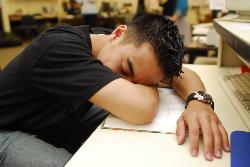“Lack of sleep” is just a component of the typical college experience, along with parties and weeks of eating Ramen noodles.
But do long nights of studying actually hurt students’ academic performance and quality of life?
Experts say yes.
Ninety percent of college students are sleep deprived, according to a 2005 study by the New York University School of Medicine Sleep Disorders Center.
And 55 percent of people, ages 18-29, reported “waking up feeling unrefreshed,” with one-third of them saying they also felt sleepy during the day, according to a 2000 National Sleep Foundation study.
DVC transfer student Jessica Morales, 18, said she sometimes fights to stay awake in class.
A full-time student, Morales also works from 2:30 to 8 p.m. and does homework until midnight.
“I wake up extra early,” she said about commuting to her 8 a.m. class. “I’m very drowsy in the morning, and it’s hard for me to pay attention.”
Symptoms of sleep deprivation include exhaustion, forgetfulness, moodiness, heavy eyelids, depression, inability to think or react quickly, frequent illness, difficulty concentrating, and drowsiness, according to webmd.com. Experts at the Mayo Clinic say teenagers need about nine hours of shut-eye per night, while adults need seven to eight hours.
 Contrary to popular belief, lost sleep must be made up, said Dr. William C. Dement, a Stanford professor and leading authority on sleep. In a telephone interview, Dement said we acquire “sleep debt,” hours of missed sleep that add up night after night.
Contrary to popular belief, lost sleep must be made up, said Dr. William C. Dement, a Stanford professor and leading authority on sleep. In a telephone interview, Dement said we acquire “sleep debt,” hours of missed sleep that add up night after night.
However, prolonged sleep loss cannot be made up in one night, he said. It’s a like borrowing money – it must be paid back – except that, unlike money, you can’t store it up.
Over the years research has found that sleep deprivation affects people’s ability to perform tasks.
“Sleep deprivation does not improve anything but your ability to fall asleep,” Dement said.
He also emphasized that the amount of sleep students get after studying is slightly more important than when the studying occurs.
“If you stay up late and at 3a.m. and learn something, it probably wouldn’t stick as well as if you learned it at midnight,” Dement said, adding that it also depends on the complexity of the material.
Another pervasive myth is that you can train your body to function on little sleep. On the contrary, research shows, we regenerate our brain and muscles, form new memories and maintain the nervous and immune systems during sleep.
Barbara Hewitt, who chairs DVC’s department of health science, said students get enough rest during breaks but begin to be deprived near mid-semester. After months of losing sleep, they get burned out.
“I see people get sick towards the end of the semester,” she said. “And who wants to spend their spring break in bed?”
But while most college students aren’t worried about their immune systems, new research reveals that the cognitive ability of a sleep-deprived person is severely compromised.
“Drowsy driving is more dangerous than drunk driving,” Dement said. In fact, losing just one night of sleep is equal to being legally drunk.
“Drowsiness is the moment when you have to make a conscious effort to stay alert,” Dement said. “[You may be] awake one second, and the next second you’ve crashed.”
Many DVC students said homework is the biggest reason they don’t get enough sleep.
Toshihiro Watanabe, 21, said he recently got only four hours of sleep after writing a five-page English paper, which is what he usually averages per night.
He said he feels “tired” and “fuzzy” at school the next day, but has no choice, given his 21 units and a job.
“Students can’t learn when they are exhausted,” said math instructor Roger Carne. He believes some sleep-deprived students are taking on more than they can handle.
But whatever the reason, anthropology instructor Pamela Streitfeld said students who nod off in class show a lack of respect.
“It’s irritating to me to be talking to the top of someone’s head,” she said. “It makes it harder for me to be supportive, even when I try to give students the benefit of the doubt.”





































































